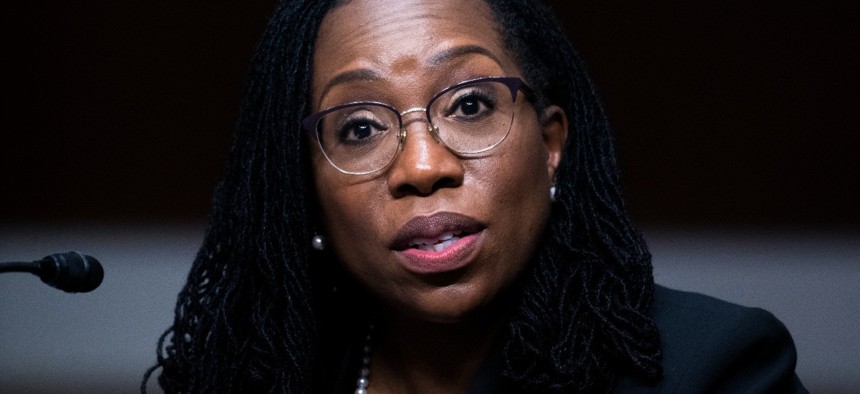
Ketanji Brown Jackson testifies during her Senate Judiciary Committee confirmation hearing for the appeals court position in April 2021. Tom Williams-Pool/Getty Images
The Senate Confirms a Supreme Court Nominee With Experience on Federal Employee Issues
Ketanji Brown Jackson overturned a trio of Trump executive orders that had made it easier to fire federal employees and limited union bargaining rights.
The Senate voted 53-47 on Thursday to confirm U.S. Circuit Court Judge Ketanji Brown Jackson, who has previously weighed in on federal employee issues, to fill retiring Justice Stephen Breyer's spot on the Supreme Court
Jackson, a judge for the U.S. Court of Appeals for the D.C. Circuit, is the first Black woman nominated to serve on the high court. She was confirmed to her appellate court post last June by a 53-44 vote, winning the support of Sens. Susan Collins, R-Maine, Lisa Murkowski, R-Alaska, and Lindsey Graham, R-S.C., in addition to every Democrat. Overall, she’s been confirmed by the Senate three times before Thursday's historic vote.
Biden made remarks when he nominated Jackson, noting why she was his choice for the high court.
“Today as we watch freedom and liberty under attack abroad, I'm here to fulfill my responsibility under the Constitution to preserve freedom and liberty here in the United States of America,” the president said. “For too long our government, our courts haven't looked like America. I believe it's time we have a Court that reflects the full talents and greatness of our nation with a nominee of extraordinary qualifications and that we inspire all young people to believe that they can one day serve their country at the highest level.”
The White House said in a statement that Jackson “is one of the nation’s brightest legal minds” and is “ an exceptionally qualified nominee as well as an historic nominee, and the Senate should move forward with a fair and timely hearing and confirmation.”
The Nominee and Federal Employees
Before joining the appeals court, Jackson, 51, was a judge on the U.S. District Court for the District of Columbia, a public defender and a clerk for Breyer. She is a graduate of Harvard College and Harvard Law School.
Jackson’s decisions may be familiar to federal employees. During her tenure on the U.S. District Court for the District of Columbia, she presided over federal employee unions’ lawsuit challenging the legality of a trio of executive orders aimed at making it easier to fire federal employees and significantly restraining how unions can collectively bargain and represent employees, signed by President Trump in May of that year.
In her decision, Brown Jackson concluded that the executive orders conflicted with the 1978 Civil Service Reform Act, because they disregarded Congress’ conclusion that good-faith labor-management relations are in the public interest and improperly “eviscerated” feds’ collective bargaining rights.
"As to the merits of the unions’ contentions, while past precedents and pertinent statutory language indicate that the president has the authority to issue executive orders that carry the force of law with respect to federal labor relations, it is undisputed that no such orders can operate to eviscerate the right to bargain collectively as envisioned in the [statute]," she wrote. "In this Court’s view, the challenged provisions of the executive orders at issue have that cumulative effect."
The Trump administration appealed the ruling, and in 2019 a three-judge panel reversed the decision on procedural grounds, finding instead that unions must first challenge the executive orders before the Federal Labor Relations Authority. When Biden took office, he rescinded the edicts and expanded agencies’ collective bargaining obligations to include permissive, non-mandatory subjects.
American Federation of Government Employees National President Everett Kelley applauded Biden’s decision, noting in a statement that Jackson’s ruling on the Trump executive orders “safeguarded federal workers’ union rights and demonstrated the limits of a corrupt administration. Her reasoning demonstrated exactly the kind of principled, independent judicial thinking that should be a hallmark of the highest court in our land.”
Erich Wagner and Courtney Buble contributed to this report.
Updated, Thursday, April 7, 3:35 pm ET






